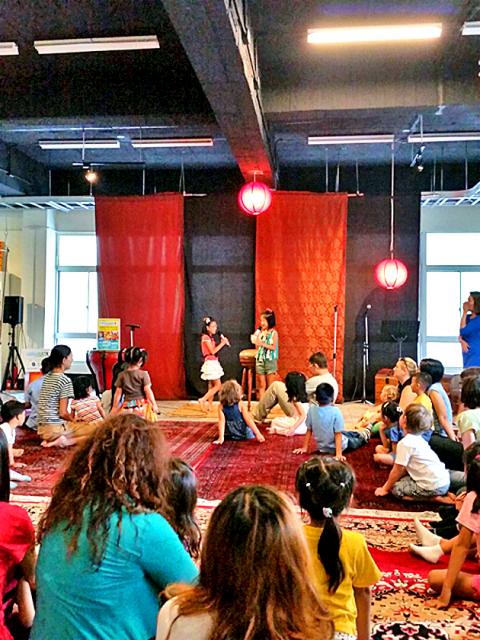The Red Room was never a room in the literal sense.
Since its inception six years ago, the nonprofit organization, which aims to provide a platform that brings together Taiwan’s creative community, took form through its array of events, held in various locations around Taipei.
“People would call and ask, ‘Hey, where’s the Red Room?’” curator Manav Mehta says. “And we’re like, ‘Sorry, the next event is in two weeks.’”

Photo courtesy of Chris Walters
Under the new name Red Room International Village, the organization opened the doors of its new space at the former Taiwan Air Force Command Center-turned-cultural park on Sept. 19 with the 71st installation of its monthly signature open mic event, Stage Time and Wine.
Red Room is only guaranteed to have the space for six months, but Mehta hopes they can extend their stay next year.
Mehta says they can now host new activities they weren’t able to before, such as the Spirits of the Night Aboriginal performance series, which debuted on Sept. 24.

Photo courtesy of Chris Walters
An art exhibition is also something that wasn’t possible without a regular venue. This afternoon, Red Room presents the opening of its first Visual Dialogues (中西對畫), a monthly art show that features a Western and Eastern artist living in Taiwan. This month’s artists, Canada’s Charles Haines and Taiwan’s Fang Yao-chung (房耀中), will be present at the event, held from 3pm to 7pm with artist introductions at 4:15pm.
Mehta says that he frequently hears about foreign artists wanting to collaborate with Taiwanese and vice versa, but that there’s something stopping both parties.
“With Red Room being a community of so many different types of people, we wanted to mix the cultures and show that there’s less of a contrast and more of a similarity,” Mehta says.
The “dialogue” will be further reinforced by not separating the two artists’ work but placing them side by side on the Red Room walls. The paintings will stay up until the end of the month.
Mehta has been involved with the Red Room since its inception, as it was started by his sister Ayesha with the help of Aveda Taiwan founder Chu Ping (朱平), who supports young entrepreneurs through his Ripplemaker Foundation. Mehta’s mother, Roma, a designer and painter, has also contributed her talents and connections to the venture.
Over the years, Red Room grew into a community with a number of regular events and collaborators, but to Mehta it was always something he did on the side.
“We always opened up shop for an event, closed down and went on with our lives,” he says.
Mehta moved to New York City about seven months ago, but when he heard that the proposal he helped write for Red Room’s new space was approved, he packed up and came home immediately.
“I grew up here,” he says. “For me, it’s like I get to come home and do my dream job.”
It’s an open space taking up the entire second floor of a building. There are no partitions, with a working table and bar to one side and a stage on the other. Much of the decorations, which include antique furniture and paintings, are provided by fellow collaborators, for example, the bar is custom made by a longtime “Red Roomer.”
“We’re sourcing our people, our friends and community,” Mehta says. “They make our space look beautiful, and we provide a platform for them. Everyone has a piece of the pie, and everyone is making this happen.”
Mehta envisions the space to be an artist hub, where people can hang out, read, paint, play music and even use it for their own events. He’s also adding more children-friendly events, such as a family art activity every fourth Sunday of the month.
In the future, Mehta is thinking of hosting workshops — ideas include the way of tea, calligraphy and cocktail mixing.
Check out their Facebook page for hours and a full list of events at www.facebook.com/redroomtaipei.

Dissident artist Ai Weiwei’s (艾未未) famous return to the People’s Republic of China (PRC) has been overshadowed by the astonishing news of the latest arrests of senior military figures for “corruption,” but it is an interesting piece of news in its own right, though more for what Ai does not understand than for what he does. Ai simply lacks the reflective understanding that the loneliness and isolation he imagines are “European” are simply the joys of life as an expat. That goes both ways: “I love Taiwan!” say many still wet-behind-the-ears expats here, not realizing what they love is being an

Google unveiled an artificial intelligence tool Wednesday that its scientists said would help unravel the mysteries of the human genome — and could one day lead to new treatments for diseases. The deep learning model AlphaGenome was hailed by outside researchers as a “breakthrough” that would let scientists study and even simulate the roots of difficult-to-treat genetic diseases. While the first complete map of the human genome in 2003 “gave us the book of life, reading it remained a challenge,” Pushmeet Kohli, vice president of research at Google DeepMind, told journalists. “We have the text,” he said, which is a sequence of

Every now and then, even hardcore hikers like to sleep in, leave the heavy gear at home and just enjoy a relaxed half-day stroll in the mountains: no cold, no steep uphills, no pressure to walk a certain distance in a day. In the winter, the mild climate and lower elevations of the forests in Taiwan’s far south offer a number of easy escapes like this. A prime example is the river above Mudan Reservoir (牡丹水庫): with shallow water, gentle current, abundant wildlife and a complete lack of tourists, this walk is accessible to nearly everyone but still feels quite remote.

It’s a bold filmmaking choice to have a countdown clock on the screen for most of your movie. In the best-case scenario for a movie like Mercy, in which a Los Angeles detective has to prove his innocence to an artificial intelligence judge within said time limit, it heightens the tension. Who hasn’t gotten sweaty palms in, say, a Mission: Impossible movie when the bomb is ticking down and Tom Cruise still hasn’t cleared the building? Why not just extend it for the duration? Perhaps in a better movie it might have worked. Sadly in Mercy, it’s an ever-present reminder of just